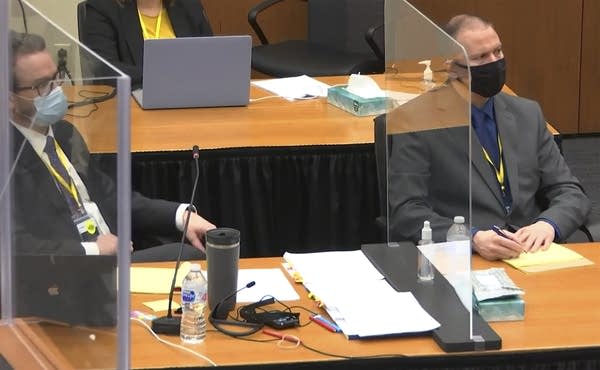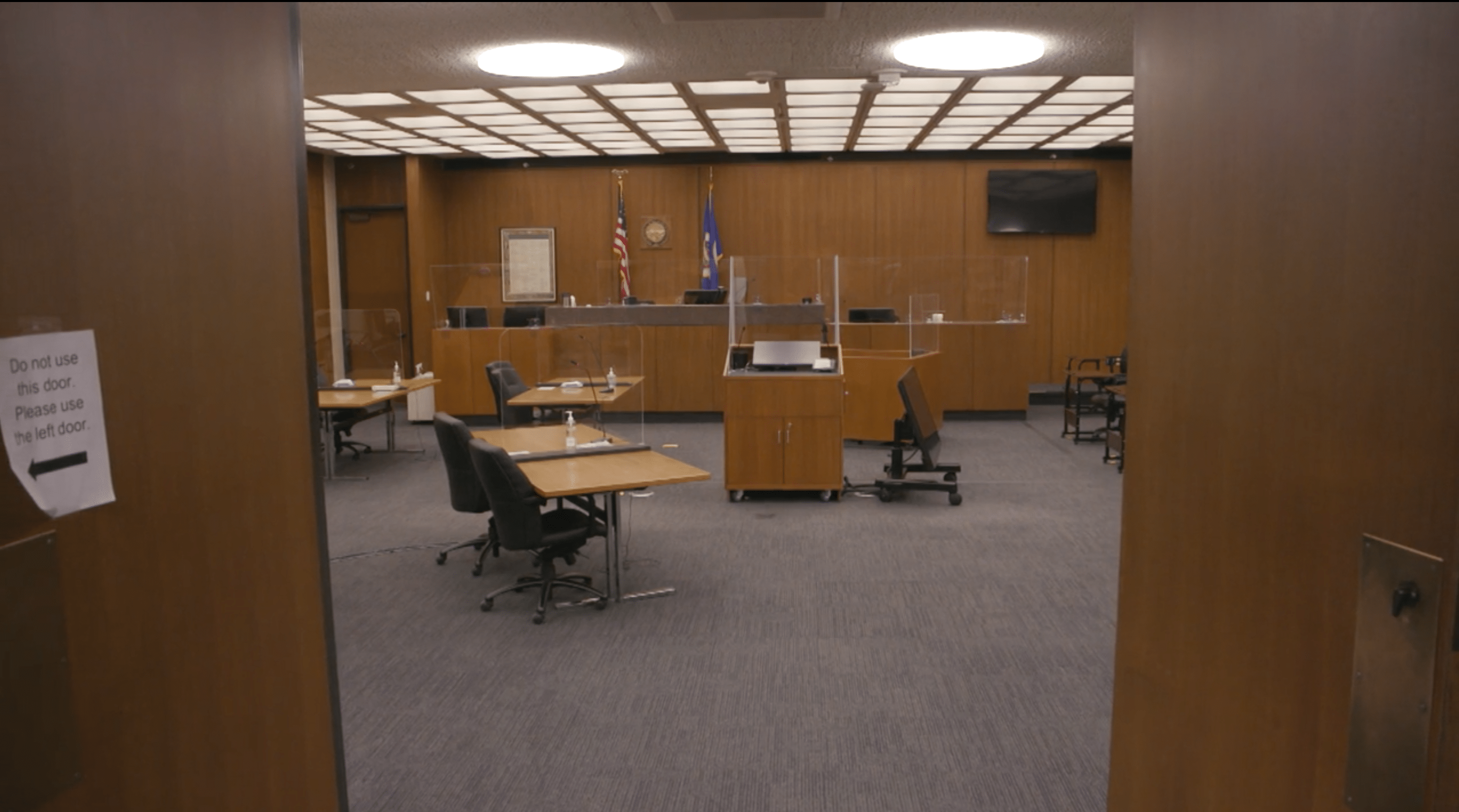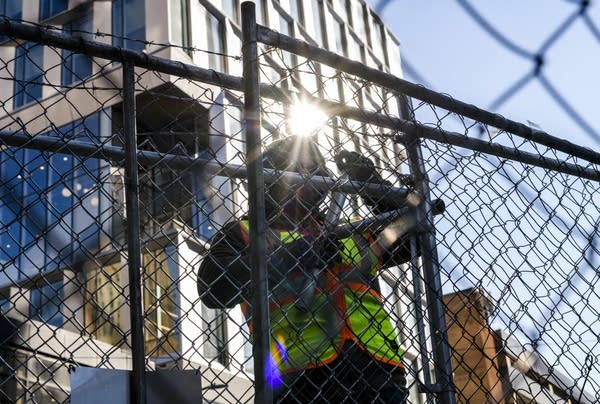Chauvin trial: Judge reinstates 3rd-degree murder charge; 6th juror chosen
Thursday's court proceedings have ended for the day

Go Deeper.
Create an account or log in to save stories.
Like this?
Thanks for liking this story! We have added it to a list of your favorite stories.
MPR News will stream live coverage of the trial on Facebook beginning at 8 a.m. Some images or material discussed during the proceedings will be disturbing to many viewers. Find a recording of this morning’s proceedings here. Watch the afternoon session here:
3 things to know:
Third-degree murder charge reinstated
6 chosen for a jury of 12, plus two alternates
Judge has ruled out descriptions of George Floyd as a “gentle giant” during the trial
Updated 4:42 p.m.
Judge Peter Cahill has reinstated third-degree murder charges against Derek Chauvin, the former Minneapolis police officer charged in the killing of George Floyd.
The Hennepin County judge said Thursday that he was bound by a Minnesota Court of Appeals decision in a separate case involving another ex-Minneapolis police officer, Mohamed Noor. The higher court had denied Noor's appeal of his third-degree murder conviction, saying it was an appropriate charge in that case.
Cahill initially disagreed with the Noor opinion and denied the prosecution's request to add back third-degree murder. The defense has argued the charge doesn't apply because Chauvin's action was directed at a single person, rather than multiple people.
Turn Up Your Support
MPR News helps you turn down the noise and build shared understanding. Turn up your support for this public resource and keep trusted journalism accessible to all.
After additional back-and-forth between the courts, Cahill decided he was bound by the appellate court decision in the Noor case.
"When intent is directed at a single person — this is a legal principle that they've established now — then third-degree may apply,” he said in court Thursday morning. “Single acts directed at a single person fall within the gamut of murder in the third-degree."
Chauvin also faces charges of second-degree unintentional murder and second-degree manslaughter in Floyd’s killing.
6th juror picked; race, ethnicity questions bubble
A sixth juror was chosen Thursday morning as lawyers continued to work through the complex process of building a jury of 12 with two alternates.
The juror said he wanted to serve because it's a big case. In his questionnaire, he wrote: “There was no reason for Chauvin to kneel on his neck for so long.” But he also said that none of it would have happened if Floyd had complied with officers.
Other prospective jurors were dismissed from the pool.
A woman, described as a single mother of two children, said she viewed Chauvin "very negatively" and that she would not be able to "unsee" the video of him kneeling on Floyd's neck because Chauvin "looked so hateful."
When asked by the judge if it would be hard to give Chauvin the presumption of innocence, she said it would.
A second person dismissed said he felt neutral about Floyd and Chauvin and has strong support for law enforcement, but he thinks police can be second-guessed. He said he thought nothing positive came out of the unrest in Minneapolis, and that the protests were hijacked.

The six jurors seated include three white men, a Hispanic man, a Black man who is an immigrant and a woman who identifies as multiracial.
Cahill described the jurors’ race and ethnicities after a man who identified himself in jury records as Hispanic was eliminated from the jury pool by the defense.
That prospective juror said bystander video of Chauvin kneeling on the neck of George Floyd made him feel like the police were behaving like an "occupying force" and that it reminded him of images of World War II.
Prosecutors challenged the defense’s dismissal of the would-be juror, arguing that the exclusion was race-based. They’d made a similar challenge earlier in the week. Cahill, though, said he saw “no pattern whatsoever from the defense of striking racial minorities.”
Civil rights attorney and activist Nekima Levy Armstrong, who’s not involved in the case, is keeping a close eye on the jury's racial makeup.
“We need people of color on the jury. We need Black elders on the jury,” she said. “We need people who have a history of understanding of the context of what’s happening in this country, and how what happened to George Floyd is a perpetuation of the lynchings Black people experienced, time and time again.”
Judge won’t allow Floyd ‘character evidence’
Wednesday began with discussions over words that might inflame and whether terms like "gentle giant" could be used in court to describe George Floyd.
In morning pretrial business Wednesday, Cahill agreed to limit the testimony of an eyewitness who is also a mixed martial arts fighter. The man will be able to offer his observations that officers may have pinned Floyd for much longer than they needed.
Those who witnessed the scene, though, won't be able to offer opinions about what caused Floyd’s death. Cahill ruled similarly on possible testimony by on-duty firefighters who responded to the scene. They will not be allowed to offer a medical opinion about what caused Floyd’s death.
It appears there will be plenty of sidebar conversations at trial when testimony touches on the expression "blue wall of silence," a term used to describe the unwillingness of police officers to speak against fellow officers. Cahill expressed concern using the phrase could inflame jurors.
The judge also cautioned he will not allow "character evidence," which he defined as any testimony that may describe Floyd as a peaceful person or "gentle giant." Murder trials traditionally allow family testimony showing the person killed was loved and valued.
"As soon as you start getting into propensity for violence or propensity for peacefulness, I think then you’re getting into character evidence,” said Cahill. “That does open the door for the defense to cross-examine about his character for peacefulness.”
Cahill expects opening statements for the the trial on March 29, although it’s still unclear if proceedings will be delayed by the questions around the possible reinstatement of third-degree murder charges.
‘Lying if they didn’t say that’
Cahill is protecting the identities of people in the jury pool. There are cameras in the courtroom, but they are not allowed to show the potential jurors, who are identified only by number, not name.
One juror chosen Wednesday, described by the in-court reporter as a white man, said he believes the criminal justice system is unfair to Black people and that they are disproportionately arrested for minor offenses. He indicated a favorable view of law enforcement and said the training officers receive makes them more credible witnesses.
"There is obviously tense situations that officers have to incur in their line of duty, and some of that takes split-second decision-making, right? And is it right to question a split-second decision-making after the fact? And that’s tough to do,” the juror said.
In other high-profile police killings, jurors have had to weigh officers' defense of being forced to make split-second decisions to shoot. This case is different. Chauvin was captured on video kneeling on Floyd's neck for about nine minutes.
The juror said he's supposed to get married on May. 1. Cahill said he could blame him if the trial clashes with the wedding.
One prospective juror shared with Nelson his deeply held beliefs for police reform and racial justice, but insisted he could be fair. Nelson wasn't buying it.
"Doesn't it feel like kind of walking into the lion's den in a sense for you?” he asked. "I think for most anyone that's walked into this, they'd be lying if they didn't say that,” the man responded. He was later dismissed by the defense.
Some in the jury pool were released after saying that security at the court building was intimidating or that they feared retaliation for their involvement with the case.
MPR News reporter Matt Sepic contributed to this report.
You can watch a recording of Wednesday morning’s proceedings here. The afternoon proceedings are here.
Trial basics

Who’s who: A look at the key players in the trial.
Need to know: 14 key questions about the trial, answered.
Jury selection: The complex process to pick jurors who will weigh charges fairly.
MPR News on its coverage: Ahead of Chauvin’s trial, Nancy Lebens, the newsroom’s deputy managing editor, answered audience questions about our reporting plans.
George Floyd and his legacy

Remembering George Floyd, the man: Before he became a symbol in the fight for racial justice, friends say Floyd was a “gentle giant” who sought a fresh start.
Making George Floyd Square: Here’s how the site of Floyd’s killing — 38th Street and Chicago Avenue in Minneapolis — is being reshaped.
Calls for change: Here’s what some Floyd activists tell MPR News about their experiences with race in Minnesota, why they march and what they hope for the future.
Read more

What would 'Justice for George Floyd' look like? Sahan Journal invited four diverse community members to this discussion.
Judge Peter Cahill: The judge overseeing Derek Chauvin's trial has a reputation for being fair and decisive.
Floyd family lawyer says trial 'a chance for justice': Ben Crump has long represented families of Black people killed by police. Crump says accountability is one thing, but "justice would be them still here with us living."
Minnesota’s reckoning with race and policing was many years in the making: George Floyd’s killing touched off a worldwide reckoning on racial justice and law enforcement, building on the outrage that had grown with each high-profile police killing in recent years.
After Floyd’s killing, police reform efforts not fast or far enough for some: Minneapolis leaders and state lawmakers want changes they say will boost officer accountability and public trust, but not everyone agrees.


